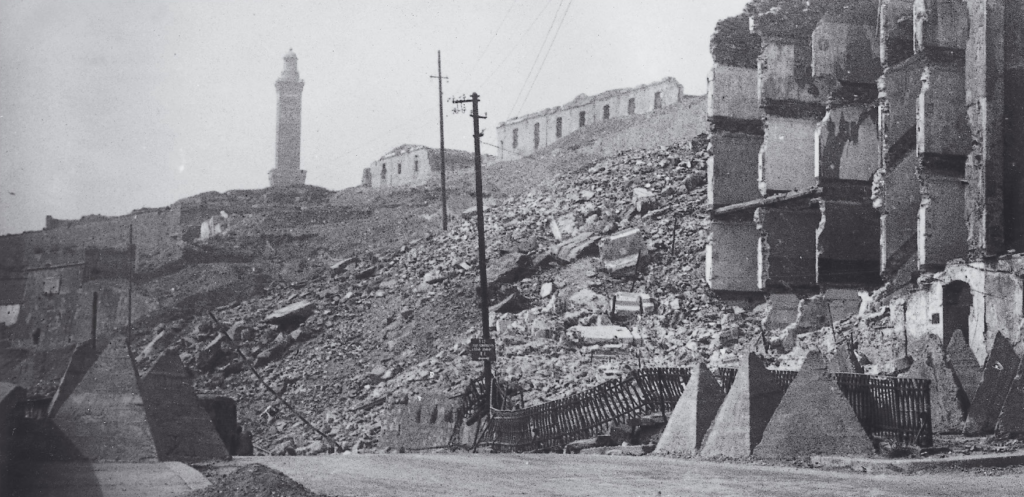Bombe sul porto e la città

Sui cumuli di rovine ai piedi della Lanterna: nell’arco dei cinque anni di guerra sono ben 86 le incursioni aeree, con il picco nel 1944 con 51 bombardamenti // On the ruins at the foot of the Lighthouse: over the course of the five-year war there were no less than 86 air raids, with a peak of 51 bombings in 1944
La Seconda Guerra Mondiale
Genova, possedendo il più importante porto italiano, fu oggetto durante la Seconda Guerra Mondiale di ripetute incursioni sia dal mare sia dal cielo, bersagliata dai bombardamenti delle truppe di Francia e Regno Unito in lotta contro il regime nazifascista.
A seguito della presenza di importanti industrie collegate direttamente o indirettamente alla produzione di materiale bellico e per interrompere la movimentazione navale, l’area portuale era uno dei bersagli più considerati dagli eserciti alleati. La batterie posizionate nelle alture, i pontoni e i treni armati si rivelarono inefficaci contro gli attacchi.
Il 10 giugno 1940 Mussolini ufficializzò l’ingresso dell’Italia nel conflitto mondiale e già nella notte dell’11 giugno gli aerei britannici gettarono 5 tonnellate di bombe su Genova, che divenne così la prima città italiana ad essere colpita nella Seconda Guerra Mondiale. Tra il 22 e il 23 ottobre del 1942, i genovesi assisterono sconvolti alla prima delle sei incursioni in cui si attuò un bombardamento a tappeto da parte della RAF (la Royal Air Force), in cui assieme alle bombe vennero sganciati spezzoni incendiari in grado di scatenare roghi violentissimi in città, nel porto, nei cantieri navali.
Bombs on the port and the city
World War II
As Italy’s most important port, during World War II Genoa suffered repeated bombings from the sea and from the air by French and British troops fighting against the Nazi-Fascist regime.
Due to the presence of major factories linked directly or indirectly to the production of military equipment and in order to interrupt shipping operations, the port area was heavily targeted by the Allies. The battalions positioned on the hills, the pontoons and the armoured trains proved ineffective against the attacks.
On 10 June 1940, Mussolini made Italy’s entry into the conflict official, and on the night of 11 June, British planes dropped 5 tonnes of bombs on Genoa, making it the first Italian city to be bombed in WWII. Between 22 and 23 October 1942, the people of Genoa watched in shock as the Royal Air Force carried out the first of six carpet-bombing raids, dropping explosives and incendiary bombs which sparked violent fires in the city, the port and the shipyards.
